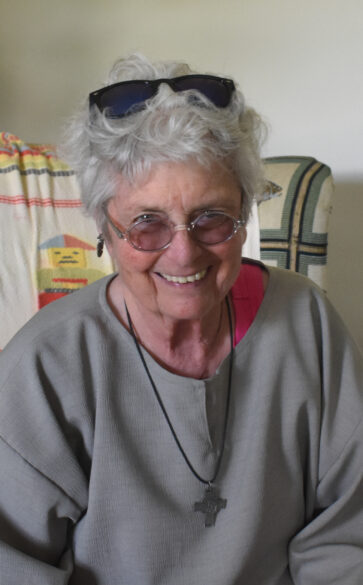FROM THE HERMITAGE
By Sister alies therese
In the Texas death house, on Nov. 9. 2023, Brent Brewer uttered these last words, “tell the family of the victim I could never figure out the right words to fix what I have broken.” And with that he was executed and died, the seventh execution this year in Texas.
In this month of November, we celebrate the dead, Dia de los Muertos, those who have gone before us, but do we pay attention, however, to every day death-dealing … wars filling the globe, hunger, abortions for inconvenience, executions, euthanasia, or the dying of those in hospital or nursing homes, fading away, cast aside?
Scars are forever things; they ache. “I thought about what death is and what loss is – a sharp pain that lessens with time but can never quite heal. A scar.” So says Maya Lin, the Chinese American creator of the Vietnam Memorial in Washington, DC where thousands of names are beautifully inscribed to serve as reminders. Maybe we have not figured out the words or the policies that will fix what is broken? Maybe they are scars that never heal?

Recently the President told us he took his grandchildren, one at a time, when they turned 15, to Dachau in Germany to see the concentration camp and to hear his instruction: never again. Never again seems a lot like here we go again when we view the world and the savage massacres of men, women and children. Having visited Dachau myself I can tell you that the chills that ran up and down my spine will never be forgotten nor the ache when visiting a friend on death row.
November is about remembrance, yes … and rightly so. About love and about loss. It is also about service and protection. Indeed. Perhaps, however, it might also be a month of renewal? A new commitment to peace, a month where like the suffering servant in Isaiah all people across the world are not murdered for who they are … Black, Native American, Asian, Hispanic, Jew, Palestinian, gay, women?
Gary Cummins in If Only We Could See (Cascade, 2015) writes, “like the suffering servant, ‘the crucified people have no form, no comeliness, no beauty, (Is 53:2) since to the ugliness of daily poverty is added that of disfiguring bloodshed, the terror of tortures and mutilations….’ As Rauschenbusch says, ‘religiosity sharpens the steel edge of intolerance.’ As Pascal says, ‘people never do evil so completely and cheerfully as when they do it from religious conviction.’”
What part of these are we ignoring?
Let’s use the rest of this month to discover what death and fear bring to the human spirit, to the soul. Of our many remembrances let’s honor those who told the truth, who did not lie to us; let’s honor those who struggled to help others, who went out of their way to sacrifice themselves, especially when it was unpopular. Consider your own scars received from abuse, or hatred, or hopelessness … and then ask the Good Jesus to wash your heart with His love so that you might not pass on any resentments or fears to others. In our tradition we remind one another that life has changed not ended and so does American teacher and writer Helen Coutant, in First Snow, who says: “At this moment, Lien thought she understood what dying meant. The drop of water had not really gone; it had only changed like the snowflake into something else.”
Let’s pray for a change of spirit, one of the beatitudes and especially draw to our hearts the tiny children who suffer so and if living with scars of anguish might just take that other path. May our prayer join those of St. Francis as Thomas Celano (St. Francis of Assisi, 1988) writes “The common view of Francis forgets that after his vision of Christ crucified, ‘he could never keep himself from weeping, even bewailing in a loud voice the passion of Christ. For this he allowed himself no consolation and filled his days with ‘sighs.’ “Let us weep as we work for justice, let us cry out to an awesome God who promises to hear us.
Blessings.
(Sister alies therese is a canonically vowed hermit with days formed around prayer and writing.)
